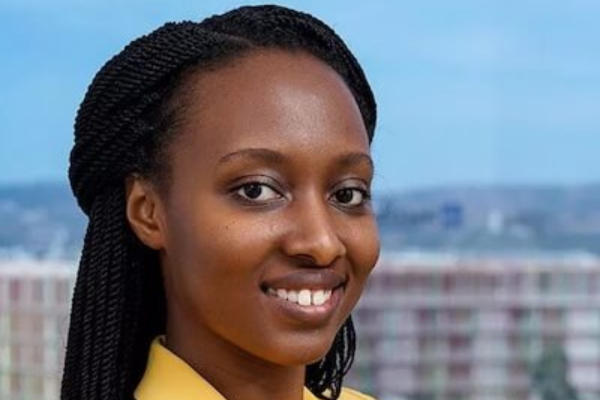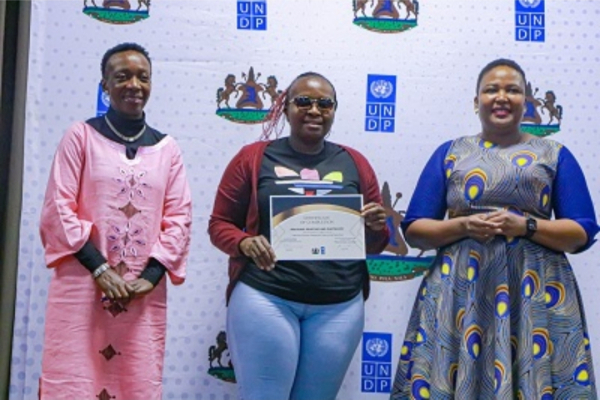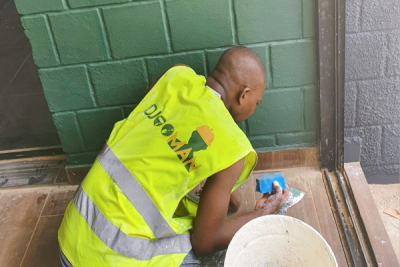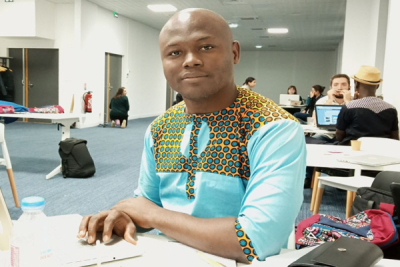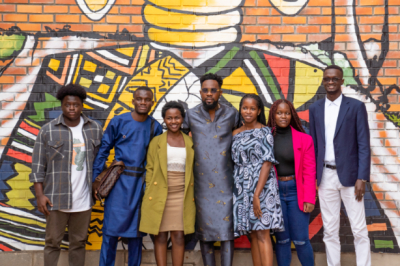A computer science graduate, she actively helps young people create innovative technological solutions. She has received numerous awards and honors for her positive impact on Africa.
Clarisse Iribagiza (photo) is a Rwandan computer scientist and the co-founder of DeepTechAfrica, a venture studio and investment fund.
Established in 2022, DeepTechAfrica was founded in collaboration with the Massachusetts Institute of Technology’s Legatum Center for Entrepreneurship and Development. It aims to develop inclusive and sustainable ecosystems focused on innovation. The organization focuses on the commercialization of research, provides consulting services, and offers educational programs. It primarily invests in deep tech startups in Africa.
Clarisse Iribagiza also serves on the board of the Allan and Gill Gray Philanthropy in East Africa, which supports the entrepreneurial ecosystem through grants and the incubation of targeted social enterprises. She is also a board member of the Africa Climate Foundation, an African strategic organization focusing on climate change and development. Additionally, she is part of the African Development Bank's Presidential Youth Advisory Group.
Before launching DeepTechAfrica, Clarisse Iribagiza founded the startup HeHe in 2010. HeHe leverages technology to create an efficient logistics service, connecting manufacturers, distributors, retailers, and end consumers, while providing access to a variety of on-demand goods and services.
She graduated from the College of Science and Technology at the University of Rwanda, earning a Bachelor's degree in Computer Engineering in 2011. She also holds a Master's degree in Organizational Leadership from the African Leadership University’s School of Business, obtained in 2018.
Her influence and achievements have been widely recognized. She was named among Africa’s 20 most influential people at the continent’s business leaders summit in 2012. In 2013, she received the "Celebrating Young Rwandan Achievers" (CYRWA) award from the Imbuto Foundation. In 2015, Forbes named her among the most promising young African entrepreneurs under 30.
Melchior Koba
Digital inclusion is essential for achieving sustainable development goals and ensuring a prosperous future. In this context, Lesotho, in collaboration with international partners, is rolling out initiatives to bridge the digital divide.
The United Nations Development Programme (UNDP) and Lesotho's Ministry of Information, Communications, Science, Technology, and Innovation (MICSTI) have joined forces to launch a groundbreaking model for e-government service points. This initiative aims to accelerate digital transformation and enhance access to public services through digital channels.
The program empowers micro, small, and medium enterprises (MSMEs) to offer essential digital services within their communities. This approach addresses the digital divide, promoting greater digital inclusion across Lesotho. Developed by the UNDP Accelerator Lab as a pilot project, the model aligns with UNDP's broader strategy to expand digital access nationwide.
By establishing e-government service points, rural and remote communities will gain the ability to access vital government services like administrative transactions, digital payments, and information services. This eliminates the need for long journeys to traditional service providers, often located in distant areas.
This significant step forward aligns with the government's commitment to provide equitable access to public services for all citizens, particularly those in underserved regions. Minister of Communications, Science, and Technology Nthati Moorosi (pictured) announced plans to designate at least 40 schools and 10 postal service locations as e-government service centers.
The establishment of these service points is expected to bring a multitude of benefits. It will stimulate the local economy by empowering small businesses and creating new employment opportunities. Additionally, it will enhance public access to essential digital services, fostering financial inclusion and community empowerment. Furthermore, the initiative is expected to reduce the time and cost associated with accessing government services, ultimately improving the quality of life for citizens.
Samira Njoya
The startup has developed a customized platform to connect individuals and professionals in the construction and public works industries.
Djooman, a digital solution developed by an Ivorian startup in 2019, aims to streamline the construction and renovation process for both individuals and construction professionals in Abidjan. The platform simplifies finding reliable and skilled artisans by leveraging technology and on-the-ground expertise.
"Djooman.ci was founded upon the observation that locating competent and trustworthy artisans is a challenging and stressful experience for individuals and construction entrepreneurs," the startup explains. "Djooman provides support to individuals and SMEs undertaking renovation and construction projects. It combines an innovative digital platform with a network of local intermediaries, known as 'Project Supervisors,' who vet Djooman's partner artisans and companies, and can offer on-site assistance to our clients."
Currently, Djooman operates through a web browser rather than a mobile application. Users can request quotes without creating an account. To do so, they provide details such as property type (building, apartment, office, etc.), location, required artisans, and a project description. Uploading photos of the worksite is also an option, allowing for a clearer project overview and progress tracking through the user workspace.
Djooman's team leverages this data to generate customized quotes and recommend the most suitable registered artisans for each project, be it new construction or renovation. The platform features a broad range of professionals, including architects, interior designers, decorators, carpenters, painters, masons, and kitchen specialists.
Adoni Conrad Quenum
The startup's name, "Kuringo," draws inspiration from the Mandinka word for cawry shells that once served as currency across various regions of Africa.
Kuringo, a digital money transfer service founded in 2020 by Muhammad Jagana, offers Gambians a convenient and affordable way to send funds internationally. The Kanifing-based startup aims to boost financial inclusion in West Africa by simplifying remittances to various African and European countries.
"Kuringo is driven by the belief that financial services should be accessible and affordable for everyone," the startup explains. "Our commitment to financial inclusion and fostering sustainable growth in the communities we serve motivates us to continuously innovate and enhance our offerings."
Kuringo's umobile application, available on both iOS and Android platforms, has surpassed a thousand downloads on PlayStore. Users can create an account using their phone number and basic personal details. Once registered, they can add recipients for quick and easy money transfers.
The transfer process is straightforward: users add the recipient, enter the transfer amount, and provide identification. The transaction is then completed with a payment from a linked bank account, debit/credit card, or any other available local payment option.
Currently, Kuringo facilitates money transfers from The Gambia to several African nations, including Senegal, Ghana, Sierra Leone, and Guinea. In Europe, the fintech startup exclusively supports transfers to the United Kingdom at this time.
Adoni Conrad Quenum
He aims to help farmers maximize their production. To achieve this, he develops smart devices that support them throughout their cultivation process. Thanks to his innovative solution, he has won several awards, both nationally and internationally.
Pyrrus Koudjou (photo) is a Cameroonian tech entrepreneur specializing in agronomy. He is the founder and CEO of Clinic Agro, a startup designed to help farmers reduce crop losses.
Founded in 2021, Clinic Agro is dedicated to improving agriculture and livestock farming. It aims to optimize farm profitability, increase productivity and food quality, and manage resources more efficiently. The company manufactures and markets soil analysis kits connected to its eponymous application.
Clinic Agro's flagship product, the Kit Clinicsol, is a smart, connected tool that measures various soil parameters such as acidity, NPK levels (nitrogen, phosphate, and potassium), temperature, humidity, and salinity. Comprised of a housing unit, a sensor, and a power source, it also helps identify the best-suited crops for the soil, determine the optimal planting time, and assess water quality for irrigation.
In addition to Clinic Agro, Pyrrus Koudjou founded Promagric in 2016, a virtual marketplace that directly or indirectly connects farmers and buyers of agricultural products to facilitate sales transactions.
Pyrrus Koudjou also leads several other projects, including Buntou, AwaData, and Tchossa IA. Buntou aims to secure remote transactions for buying, selling, and investing for both individuals and professionals. AwaData is a project by M & T Consulting, an IT services and consulting company. Tchossa IA is an intelligent conversational agent.
A graduate of the ISEM-IBCG university group, now known as the Institut Universitaire des Leaders (USL), Koudjou earned a professional degree in software management, database administration, and network and system administration in 2014.
In 2019, he won the Orange Social Venture Prize in Africa and the Middle East (POESAM) in Cameroon. He also won the "Cultivate Digitally" award from Société Générale's Hacklab Africa and a grand prize in the "Hope" category at the Agri Startup Summit. In 2022, he took second place in the ICT Innovation Challenge organized by the Cameroonian Ministry of Posts and Telecommunications. He was also a laureate of Orange Fab Cameroon.
Melchior Koba
The Patoranking Foundation, led by musician Patrick Okorie (Patoranking), has partnered with ALX Africa to offer $500,000 in tech scholarships. Starting May 30, 2024, the initiative will train 40 young Africans in data analytics, cloud computing, and Salesforce Administration.
The scholarships aim to boost tech skills and provide internship opportunities with global companies. Applicants must complete the ALX admissions process and submit application videos and essays.
This new initiative aims to nurture Africa’s next generation of tech leaders.
As the African Union's Digital Transformation Strategy for Africa (2020-2030) underscores, leveraging digital technologies is crucial for driving economic growth, improving governance, and enhancing the quality of life. The focus of African governments on AI exemplifies this strategic vision, potentially leading to increased investment in technology and infrastructure across Africa.
Zambia has finalized its Artificial Intelligence (AI) policy to drive economic growth. It is set to launch within two months, Science and Technology Minister Felix Mutati announced.
Speaking at the Copperbelt Agricultural Mining and Industrial Networking Enterprise, held from May 28 to 30, in Kitwe, Mutati highlighted AI's potential to help Zambia achieve its target of producing 3 million tonnes of copper annually through improved exploration. "AI will bring significant economic benefits," Mutati said, noting it will create jobs and expedite mineral exploration.
To prepare for an AI-driven future, Zambia will host an AI Conference next month. Compu-Connect Education will organize “The Future of AI in Africa” Global Summit and Expo from June 25 to June 27. Mutati emphasized the conference's role in exposing Zambia to the latest technological innovations and helping the public understand AI's impact.
According to the “ZAMBIA Inclusive Digital Economy Status Report” 2022, digital technologies are central to Zambia’s development strategy, as shown by their integration into national and sectoral plans and policies. The Seventh National Development Plan (7NDP) highlights enhancing ICTs as one of its key outcomes. This includes strengthening the legal framework, improving ICT infrastructure, and providing electronic services.
This initiative aligns with Zambia’s commitment to inclusive governance. By embracing AI, the country aims to enhance productivity, drive economic growth, and bridge the digital divide, setting a precedent for other African nations.
Hikmatu Bilali
A passionate computer scientist, he uses technology to address the problems facing vulnerable populations in Africa. He has developed several innovative solutions and has received numerous awards.
Djibril Sagna (photo) is a Senegalese computer scientist and entrepreneur. He is also the CEO of Impact Solution, a startup founded in 2018 that offers innovative technological solutions in various fields such as healthcare, transportation, commerce, education, and management.
Under Djibril Sagna's leadership, Impact Solution has developed several groundbreaking solutions. One of the most notable is Kereya, an electronic medical records platform designed to improve healthcare access and patient outcomes, particularly in rural areas of Africa. The said platform aims to enhance care coordination, reduce medical errors, and strengthen the capacities of healthcare personnel while eliminating the inefficiencies associated with manual paper record management.
Another brainchild is iTRANS-Voyagel, a platform that modernizes urban transportation by allowing users to plan and pay for their public transport journeys. In May 2024, the company won the Innovation Award from the Executive Council for Sustainable Urban Transport in Senegal, sponsored by Orange Business Senegal.
Additionally, Impact Solution established the Impact Digital Center, an information and support hub for students and digital project initiators. The center offers innovative and intensive programs, where a team of experts collaborates with beneficiaries to identify and solve their problems.
Besides his roles at Impact Solution, Djibril Sagna has been the IT manager for the Network for Health, AIDS, and Population (RESSIP) of the European NGO platform in Senegal (CONGAD) since 2016, where he manages the health NGOs' database. He is also a web developer for Senegalese NGO Connexion Sans Frontière.
Djibril Sagna graduated from the Faculty of Legal and Political Sciences at Cheikh Anta Diop University in Dakar with a master's degree in law in 2015. He also holds an engineering degree in software engineering obtained in 2017 from IAM Tech, the technology school of the African Institute of Management (IAM). Between 2018 and 2020, he worked as IT director for AFRICKONCEPT, an international company specializing in ICT development in Africa.
In 2022, at the Africa Entrepreneur Summit in Paris, he received the Impact Award for Kereya. He also won the Health Disrupt Senegal Contest Award presented by Free Senegal.
Melchior Koba
The Malagasy government is committed to ensuring the country benefits from the technological revolution. Alongside infrastructure development, it is also focusing on training a highly skilled workforce.
Madagascar is taking a step towards becoming a leader in artificial intelligence (AI) within the Indian Ocean region. On Friday, May 31, Malagasy Minister of Digital Development, Posts and Telecommunications Tahina Razafindramalo signed a partnership agreement in Marrakech, Morocco, with Professor Serge Miranda of the University of Côte d'Azur and École Supérieure des Technologies Industrielles Avancées (ESTIA) in France. The agreement launches a feasibility study for the establishment of an International Institute of Applied Artificial Intelligence for the Indian Ocean region.
According to the Malagasy Ministry of Digital Development, "the creation of this institute will stimulate innovation and economic growth in Madagascar, while providing increased opportunities in education and quality employment. This initiative also demonstrates that public-private partnerships can be beneficial for emerging countries."
The project involves a collaboration between DATUM Consulting - Groupe ArkeUp, ESTIA, and the Ministry of Digital Development. Aligned with Madagascar's Digital Strategic Plan (PSN) 2023-2028, the institute aims to position the country as a key player in AI within the sub-region. The PSN highlights a critical deficit of 40,000 technicians needed for successful digital transformation.
The feasibility study will assess the specific needs, required resources, and key implementation steps for the institute. It will also evaluate the economic, educational, and social impacts of the initiative. This evaluation will consider the challenges and opportunities of integrating AI into various economic and social sectors across Madagascar. This ambitious project aspires to not only bridge the technical skills gap but also establish Madagascar as a center of excellence in AI for the Indian Ocean region.
At the first edition of Gitex Africa, the two entities formed an alliance to collaborate in the digital sector in Senegal. They signed another agreement a year later for the same purpose.
Sénégal Numérique SA (SENUM SA), the public company responsible for managing digital infrastructure in Senegal, and Elm, a Saudi company specializing in digital solutions, signed a memorandum of understanding on Thursday, May 30, during the second edition of Gitex Africa in Marrakech, Morocco (May 29 to 31).
"The memorandum of understanding, signed by Al-Ameen Al-Hazmi [photo, left], Director of Integrated Solutions at Elm, and Cheikh Bakhoum [photo, right], Director General of Sénégal Numérique, outlines the collaboration between Elm and Sénégal Numérique for the creation and operation of a digital archiving center. They will also seek financial partners to fund the project and develop IT infrastructure for the benefit of Senegalese government agencies," explained he communiqué published by the Saudi firm on Friday, May 30.
This partnership aligns with SENUM SA's objectives for 2025, as outlined in the "Sénégal numérique 2025" strategy document. It will facilitate knowledge exchange between Saudi Arabia and Senegal and stimulate the tech sector to become a driving force in both countries.
This is not the first memorandum signed by the two entities. Last June, during the first edition of the Gitex Africa tech show, also held in Marrakech, they signed a partnership agreement under which the Saudi firm agreed to assist SENUM SA in using technology to boost economic growth, improve public services, empower Senegalese citizens, and promote digital inclusion.
Speaking on the new partnership, Majid bin Saad Al Arifi, official spokesperson and Senior Vice President of Marketing at Elm, stated: "We remain committed to collaborative projects and promoting innovation and growth in the digital sector. We also hope that this partnership will yield tangible economic and social benefits by driving development through innovative technical solutions and Elm's capabilities to enable a digitally connected life."
Adoni Conrad Quenum
More...
Although the e-commerce sector in Africa is promising, it still faces numerous challenges. The development of this sector requires close collaboration between various stakeholders.
The Republic of Guinea plans to collaborate with the United Nations Conference on Trade and Development (UNCTAD) to boost its e-commerce sector. The Guinean Minister of Posts, Telecommunications, and Digital Economy, along with her team, discussed this initiative with Shamika Sirimanne, Director of Technology, Innovation, and Research at UNCTAD, on the sidelines of the World Summit on the Information Society held in Geneva from Monday, May 27 to Friday, May 31.
"The objective of this meeting was to explore avenues of cooperation between Guinea and UNCTAD, particularly in the field of e-commerce. Minister Pricemou presented the state of digitalization in Guinea, highlighting the challenges and opportunities," stated the ministry's communiqué.
During the meeting, Guinea sought UNCTAD's support for developing a regulatory framework conducive to the growth of e-commerce and for enhancing the digital skills of Guineans through technical assistance.
The UN organization welcomed this request and committed to facilitating contacts within the United Nations system to promote digital and postal services in Guinea. Additionally, it recommended close collaboration between the Ministry of Posts and the Ministry of Commerce to foster the development of trade in Guinea.
This meeting between the Guinean Ministry of Digital Economy and UNCTAD is part of the government's ongoing efforts to promote the e-commerce sector in Guinea. This rapidly growing sector was already valued at 10 million dollars in 2020, with an annual growth rate of 20%, according to the Foundation for E-commerce and Distance Selling (Fevad).
Samira Njoya
After years working as a lawyer in England, she returned to Africa to venture into entrepreneurship. She uses technology to empower Black women.
Gisela Van Houcke (photo) is a lawyer and entrepreneur from the Democratic Republic of Congo. She is the founder and CEO of Zuri, a women-led beauty tech platform.
Founded in 2016, Zuri aims to empower Black women through beauty and technology. The platform provides Black beauty entrepreneurs with software tools, branding, supply chain access, and financing needed to enhance their economic mobility and that of their clients.
The idea for Zuri came from an observation by Gisela Van Houcke. "When I came back to Africa, I immediately noticed a gap in the market for extensions and cosmetics, particularly for people with dark skin. People around me were always asking me to bring back extensions and cosmetic products when I traveled. This gap was simply inconceivable; Africa having a large number of people interested in such products," she explains.
Gisèla left her country for the UK in 2003 due to wars and political instability. She studied at Cardiff University, where she earned a bachelor's degree in law in 2013. She then worked as a lawyer at Skadden, Arps, Slate, Meagher & Flom LLP and Affiliates, a UK law firm.
In 2015, she became head of the legal department at BBOXX, a British company developing smart solar solutions for developing countries. After moving to Africa, she resigned in 2017 to dedicate herself fully to Zuri. Today, Zuri has 20,000 clients and employs 60 women.
In 2018, Gisela Van Houcke was named in the Forbes 30 Under 30 list in the business category. She is also listed in the top 50 of Africa's Business Heroes 2023.
Melchior Koba
He advocates for a circular economy in Morocco. Leveraging technology, he encourages Moroccans to adopt responsible consumptio habits.
Moroccan entrepreneur Bentaleb Yassine (photo) is a marketing expert and the founder and CEO of Foodeals, an innovative startup dedicated to combating food waste in Africa.
Founded in 2020, Foodeals connects restaurants, bakeries, supermarkets, and Moroccan citizens, thereby committing to reduce food waste. In collaboration with professionals, its mobile platform offers a variety of menus daily to meet the expectations of its users. On May 29-31, 2024, the startup, represented by Bentaleb Yassine, showcased its solutions at GITEX Africa, a major event held in Marrakech.
In addition to Foodeals, Bentaleb Yassine founded and manages Smartmove Consulting, an independent consulting firm based in Fez since 2015. This firm assists and advises companies, public institutions, and associations in managing their stakeholder relationships.
In 2017, he co-founded Al Fihriya Birdies, a coworking space, incubator, and accelerator for Moroccan startups, where he served as marketing manager until 2018.
Bentaleb Yassine holds a degree in marketing and commercial actions from the National School of Commerce and Management in Settat, Morocco, and a bachelor's degree in marketing from the European Business School in Paris.
His professional career began in 2011 at Banque Centrale Populaire du Maroc, where he worked until 2022. During his tenure at this institution, he held several positions, including prospect acquisition manager, sales representative, and trade finance manager.
Between 2015 and 2017, Bentaleb Yassine was a guest lecturer at the University Sidi Mohamed Ben Abdellah in Fez. Concurrently, he served as a mentor for the employability platform Ta3mal, launched by Silatech and Microsoft, and as a business mentor for Injaz Al-Maghrib, an association promoting entrepreneurship among young Moroccans in public schools.
Melchior Koba
The introduction of new satellite connectivity options is crucial for Africa's development. Enhanced satellite communications can bridge the digital divide, providing reliable internet access to underserved and remote areas.
UAE-based satellite operator Yahsat and Zimbabwe’s SATCOM Technologies have partnered to provide satellite connectivity in Zimbabwe, Yahsat revealed on May 29. This comes just a week after the country authorized Starlink, signaling rapid advancements in the country's satellite communications landscape.
“We are proud to partner with SATCOM Technologies to bring our state-of-the-art satellite connectivity solutions to Zimbabwe. This strategic partnership demonstrates our commitment to improving connectivity across the continent, supporting the digital transformation journey of African nations and increasing access to essential services for all,” said Chief Commercial Officer of Yahsat Sulaiman Al Ali (pictured).
The two companies will be able to work closely with the Zimbabwean government to secure projects in several key sectors, including mining, agriculture, health, and education. The services are expected to go live in June this year.
Satellite technology is important in bridging the digital divide and improving access to essential services in Africa. In its 2022 report ‘Stronger Digital Voices from Africa: Building African Digital Foreign Policy and Diplomacy’, the International non-profit organization Diplo reveals that Africa primarily relies on mobile networks for internet access due to insufficient copper telecom infrastructure. While terrestrial and mobile networks dominate, satellites increasingly provide connectivity, especially in remote areas. It adds that countries like Algeria, Angola, Egypt, and Nigeria are adopting geosynchronous equatorial orbit (GEO) satellites for internet, while Low-Earth orbit (LEO) operators like Globalstar and SES are expanding, with Starlink's constellation of low-orbit satellites being a notable recent development.
Hikmatu Bilali


